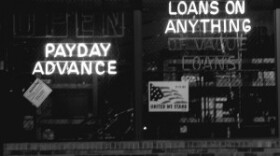More than 15,000 victims of a predatory lending scheme in Virginia are having their loans absolved and receiving cash awards. That’s thanks to a $15 million settlement agreement approved in federal court in Richmond this week, one of the largest of its kind in history.
If you’ve watched much late night TV, you’ve probably come across a commercial like this.
“Western Sky can put up to $5,000 in your checking account by tomorrow. So get off the payday treadmill.”
The commercial features images of tee-pees and a tribal drumbeat. The company bills itself as having ties to the Cheyenne River Sioux Tribe in South Dakota. But Virginia Attorney General Mark Herring says it’s nothing more than a fraud, a scheme he calls rent-a-tribe.
“There was a thinly veiled attempt to try to create the appearance to a connection to a tribal entity when in fact they really didn’t have one, and then made people think that state laws like our usury laws didn’t apply,” says Herring.
That’s because loans given by Native American tribes don't have to follow state or federal rules. But this week, Herring proved in federal court that this particular company was not connected to a tribe, winning victims a $15 million settlement against the California-based business known as CashCall in one of the largest settlements of its kind.
“With that kind of a scheme involved it was really important to send a real strong message that as attorney general, I’m going to stand up against that kind of predatory tactic in what we believe was misleading for consumers,” says Herring.
Jay Speer at the Virginia Poverty Law Center has been working with victims of that scheme for years.
“Well I’m really happy that we’re getting seem relief for these people, because some of these folks have paid many thousands of dollars,” says Speer.
The loans that were often in excess of two hundred percent interest, interest that has now been deemed illegal. Speer says CashCall is not the only business engaged in this kind of fraud.
“We get a lot of people calling our office with problems with internet loans and so I see a lot of the contracts," Speer says. "I’d say a majority of the contracts I see now try to claim they’re connected to some sort of Indian tribe.”
Virginia is not alone in tackling the problem. Recent years have seen a number of states take action against this kind of scheme, from Georgia to California, even the District of Columbia. Diane Standaert at the Center for Responsible Lending says the settlements are a growing trend.
“In some cases, depending on the state law, illegal loans are void and uncollectible," says Standaert." In others, the other states are receiving millions of dollars in restitution to harmed consumers.”
Here in Virginia, both happened. CashCall is not only absolving the initial debt, they’re also paying victims back all the interest they should never have been charged.
Overall, that’s a $15 million settlement in a case that many people consider a sad reminder of how Native Americans have been exploited in this country.
“In many ways, it’s just another form of abuse piled upon what we have done to Native Americans," says Virginia legal expert Rich Kelsey. “You’re talking about sophisticated fraudsters using a new version of fraud preying upon the poorest of the poor, and when you look at the interest rates charged to these people for this money it is beyond the pale.”
Shortly before approving the settlement, the federal judge John Gibney said, “When you look at this case, your jaw drops at what a predatory scheme this was.”


